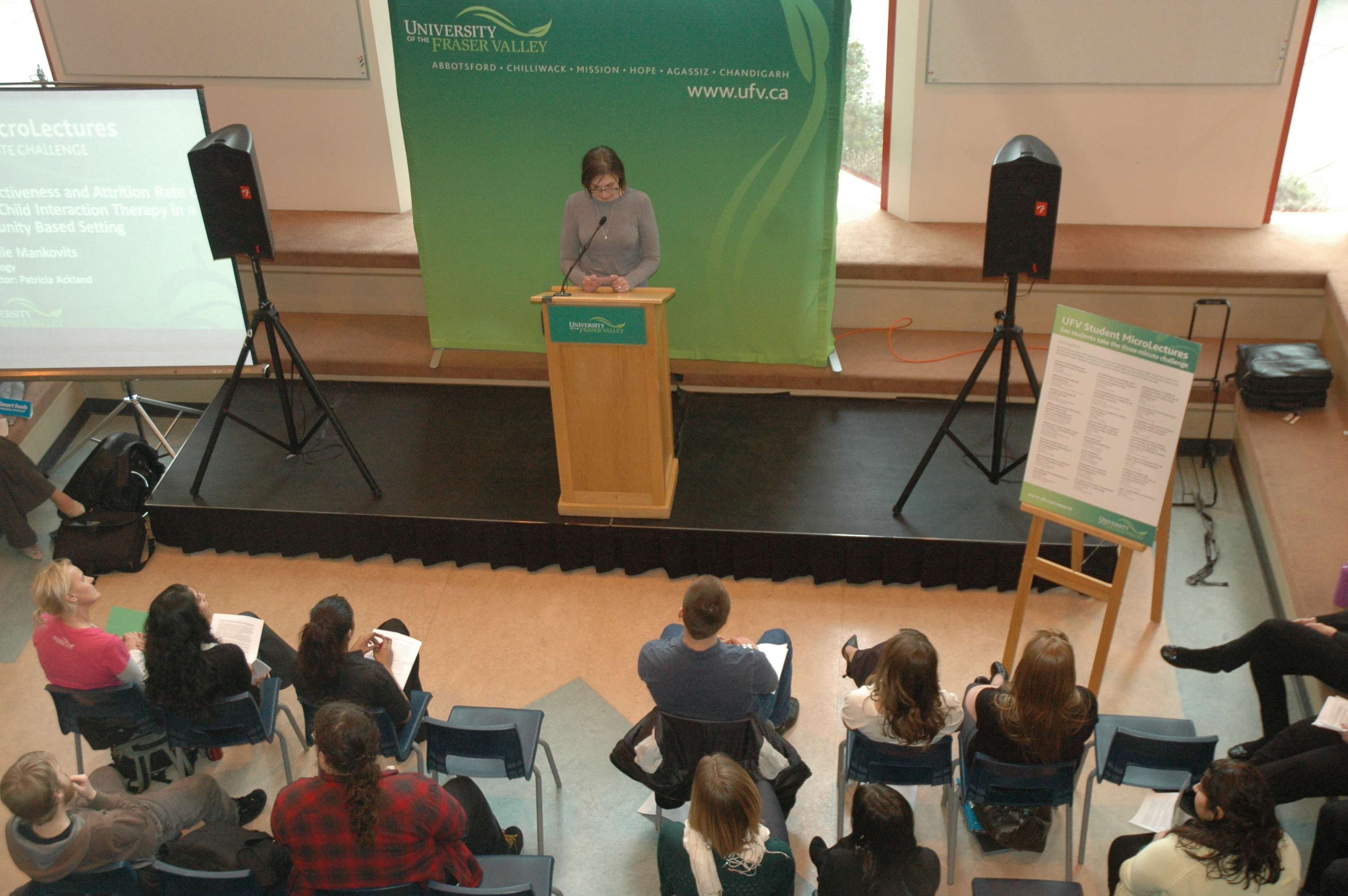Date Posted: April 8, 2011
Print Edition: April 8, 2011
By Paul Falardeau (Arts & Life Editor) – Email
 One of the key distinguishing features between universities and other post-secondary institutions is their dedication to the research of faculty and students. The UFV lecture series, for one, highlights some of the interesting and timely research professors in every department are conducting, and their recent set of “microlectures” expanded on those talks. Thursday, March 31 held even more opportunity to see the kind of research happening at UFV, with the unveiling of another set of microlectures. Perhaps more excitingly, this time around the focus is on student work.
One of the key distinguishing features between universities and other post-secondary institutions is their dedication to the research of faculty and students. The UFV lecture series, for one, highlights some of the interesting and timely research professors in every department are conducting, and their recent set of “microlectures” expanded on those talks. Thursday, March 31 held even more opportunity to see the kind of research happening at UFV, with the unveiling of another set of microlectures. Perhaps more excitingly, this time around the focus is on student work.
“Microlectures” are short summaries of research; they are given over the course of three minutes for students – one minute longer than professors are allotted. In this short duration, the student on the stage is expected to introduce their work and present their methods, findings, and conclusions on their subject.
Many disciplines were represented at this year’s Microlectures – held in the study area at the Roadrunner Café – including biology, chemistry, history, sociology, philosophy, criminology, and more. Student’s research topics ranged far and wide, from Myles Lamont’s study of homology between white-faced whistling ducks separated by the Atlantic Ocean or Kelsey Siemens’s consideration of the power of the newspaper in affecting citizens during World War II to Angela Ostrikoff’s work with street children in Dar es Salaam, Tanzania.
Ostrikoff, a sociology and geography major who spent time in Tanzania and Kenya last semester with professor Cherie Enns, said UFV has been supportive of her work and that the microlectures are an example of that. “[UFV] has allowed me the opportunity to be a part of this internship [in Tanzania], thus allowing me to gain valuable life and career experience,” she explained, adding: “It affected me by allowing me to closely know girls who live in these conditions. It also showed me how complicated it can be to work with street girls, and as much as a simple answer is wanted, it is next to impossible to get one; having said that, seeing one life changed positively fills you with enough hope to keep on chasing after solutions.”
“Oral history is relevant,” said Ostrikoff of the importance of her research, “because not everyone will travel to see street children, but they can all be moved by their stories and compelled to donate or support organizations that are.”
Siemens is a history student who is currently working as a research assistant to Dr. Scott Sheffield, as well as completing a directed study under his supervision. The title of her research was “’Enemy Aliens’ and ‘Conchies’: Perceptions of the ‘Un-British’ in the Fraser Valley, 1939-1946.”
“I think it is important to understand my community, where I have come from, and the experiences of my ancestors,” Siemens said of her work. “My grandfather, who was a conscientious objector, grew up in the Fraser Valley and worked in a CO Camp, and it has been very interesting learning more about how the war affected him and his closest friends and family. Most historical works on the Canadian experience during the Second World War have focused on broader political, economic, social, cultural, or military themes, whereas my research looks at the experience of the average Canadian on the home front.” Siemens explained that knowledge of this kind of local history can assist in better understanding the formation of a community’s identity; her research has specifically focused on how constructions of race manifested themselves in the Fraser Valley.
Siemens echoed Ostrikoff’s praise of UFV in supporting student research: “The University has been incredibly supportive of my work. I am very grateful that I have been able to have access to the Centre for Social Research lab, where I utilize a brand new micro-reel scanner to conduct my research. In addition, Dr. Sheffield (and other history professors I have worked with) have been very willing to work through my findings and scattered thoughts in order to form some sort of comprehensive argument. Dr. Sheffield has also contacted local facilities, like The Reach, in order for me to gain access to archival material for my research. I am enjoying being able to delve into arc


